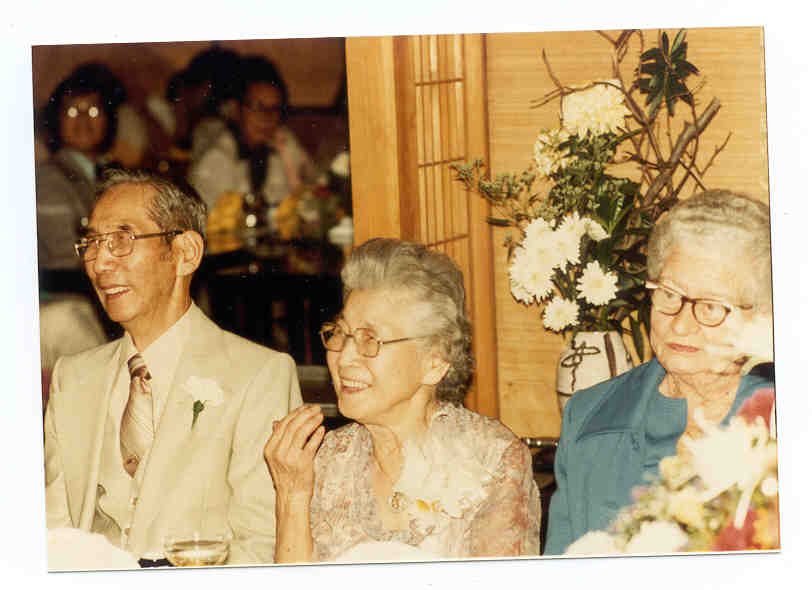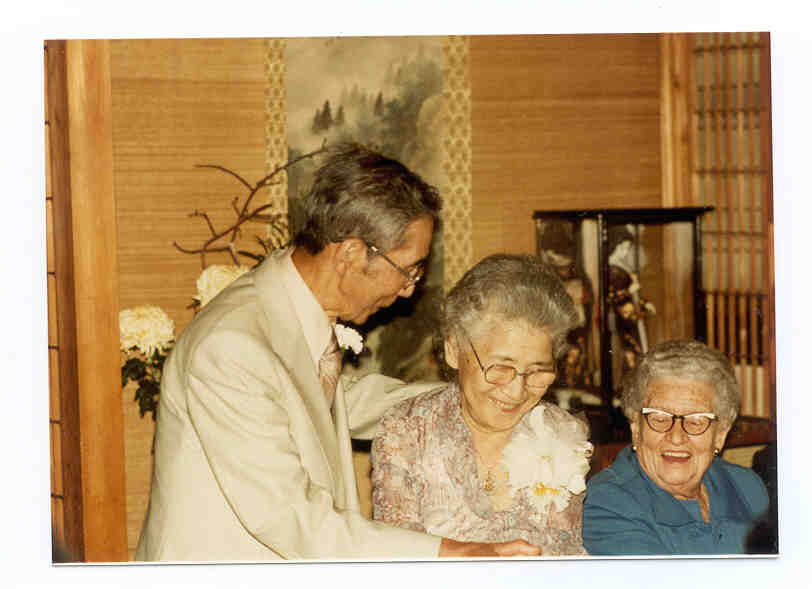

PAPA'S APPLE PIE
A Toast to Papa and Mama on Their sixtieth Wedding Anniversary
It seems now like it was a long, long time ago that I first met Papa--and he was already old then.
That was nearly two decades ago. I was younger then and very preoccupied with my own youth, I suppose. So, I remember our first meetings only as shadowy fragments, like an old, faded photograph, or the recessed corners of my childhood memories of grandmother's living room.
Not long after those first meetings with Papa, one of this Century's many wars drove me and my new bride, Papa's youngest daughter, to a foreign land far away from Papa. And it was mostly her stories about him that helped fill in the sketchy picture in my mind.
I love listening to those stories for my wife is a good story teller, and each story was like another dab of pain on a painter's brush, helping to color in the portrait of Papa I held in my memory.
There were stories of money collectors long ago in Japan, who sealed off his grandfather's house, making Papa's little sister cry because she could not get to her new dress, locked inside, for the annual children's parade that day, and stories about his nightmare trip to America in the stinking hold of ship, and of Pap's dream to make money and to return home. Then there were more stories of hard work on the railroads, of blowing up tree stumps with dynamite for farmers, and stories of a sometimes irresponsible father who gambled away Papa's hard-earned wages. There were stories too, of Mama and her sailing trip across the Pacific Ocean to Victoria B.C., and on to Oregon. And, of course, there were many stories about Papa's apple farm in Hood River and about his second Odyssey--spurred by another, earlier war, which drove him and Mama and their children to a concentration camp in Idaho, where my wife was born, and which eventually brought Papa and his family here to Chicago.
I enjoyed all these stories, but the one I always liked best was the story about Pap's early life in America, about how after a hard day's labor, Papa would sit on the ground with his back resting against a tree stump too tired to eat, and watch the sun set behind the mountains to the West, and behind that the Ocean...and home in Japan, which lay far beyond his reach. Then a wave of uncontrollable homesickness would well up inside him and pour out through his eyes.
Homesickness is like that. It can attack suddenly, without warning and hurt like a bad stomachache.
I have a special sympathy for this story. Being uprooted from home can be like being smashed into a stone wall at sixty miles an hour and being the only survivor in the car. Suddenly the life you knew is over and forever out of reach. You feel like a puppet on strings, being jerked up of the ground and left dangling in mid-air will your hands and your feet and your heart touching nothing. All your hopes, your dreams and your past are cut away from you and you from them. Everything familiar is gone, and all at once the world is filled with strange meanings.
Papa, as one story was told to me, tired washing in a toilet bowl until someone stopped him.
There is so much more to learn in a foreign place than just the words of a new language.
Some people, when they are left dangling in this state of cultural shock, recede into their bodies and become small like a dried pea in a big shell.
But Papa was a pioneer.
Too often we think of a pioneer only as someone who hacks out a clearing in a forest for himself and his family. But a pioneer is something more. There are, of course, many different kinds of pioneers, yet they all share one thing in common: they are the bridge-makers who make connections between two places--over distance or time--for others to travel.
So a pioneer is a bit like a spider.
On those sad nights Papa sat watching the sun set and threw imaginary strands to silver thread from his heart over the mountains and across the ocean. Those threads were an anchor line, looking for a place to take hold. But such threads from the heart are magical and do not land at a childhood home, on a driveway, or even in a favorite old climbing tree. They stay up in the air--and grab of a spirit, for an ideal.
I think Papa's tread flew back over a great distance--over mountains and oceans--but also it flew back in time, back past his father and grandfather and their ancestors, back to the shadowy time of beginnings where it latched hold of the very stuff civilization itself is made.
And across that great gulf to time, Papa's thread made a bridge that carried forward the two most important parts that make up civilization: family and the essence of families--love for children.
I know this because I learned it from him through his youngest daughter whose treatment of our own son--one of Papa's many grandchildren--springs from centuries of values taught her by Papa: Papa, who did not dry up like a pea in a shell, but who married Mama and who together built the bridge that has brought us all here tonight.
Chicago, August 26, 1979

Tributes, communications to and from family members: Junior, Dorothy